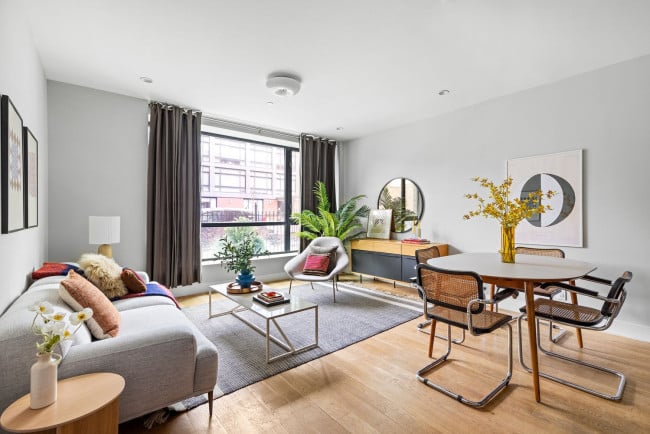How much should you renovate your NYC apartment or house before selling?
- Getting a good price isn’t the only goal—selling quickly is another reason to upgrade
- Stress, inconvenience, and your construction timeline are important considerations

Even when a renovation fails to increase the final sale price, it can move an apartment faster, saving you money in carrying costs.
iStock
It’s one thing to renovate your apartment or brownstone when you will enjoy the results. But what about when the renovation is solely to make your property more appealing to buyers so you get a good price and stand out from other listings? That's the million-dollar question: How much should you renovate before you sell?
The answer depends on several factors. For starters, you need to consider the type of property you are selling, the condition, and your total budget. What’s more, getting a good price isn’t the only end goal; selling quickly is another valid reason to renovate.
[Editor's note: An earlier version of this post was published in February 2023. We are presenting it again with updated information for January 2026.]
Another important consideration is knowing what will resonate with buyers, who have emerged from the last few years with different wants, needs, and expectations, said Asher Lipman, founder of nycRenovationCoach, which advises New York City homeowners, buyers, and real estate agents on renovation issues.
A renovated apartment typically commands what Lipman calls a "convenience premium."
"The main reason for the price bump is that many people either lack the time or vision, are concerned over hiring the 'right' people, or don't want to deal with the overall disruption and stress associated with renovations," he said. "In this era of instant gratification, some people just want to bring their furniture and toothbrush and move in."
Even with tight inventory and relatively high mortgage rates, he said that the savvy seller, working with the right team, can create value and equity through their own renovation.
Assuming a renovation makes sense for your situation, Lipman said the key question is whether to renovate the entire apartment or only part of it. Do you refinish the floors and freshen the paint, or do you renovate the kitchen and/or bathroom(s)? Do you do a basic remodel or go all-out?
Read on for more intel regarding how much—or how little—renovation work you should do before selling.
Maximize your rental income with Blueground and let them manage the entire process end to end! Blueground partners with property owners to transform their empty units into fully furnished, turnkey apartments. Then they rent them out using a vetted, high-quality tenant network while you sit back and enjoy rental revenue upside.
Do the math to avoid over-renovating
Under-renovating is one mistake—but overdoing it is even worse for your wallet. How much, then, should you spend? Can you get away with cosmetic improvements (painting the walls and replacing that tired kitchen faucet), or are more extensive updates worth the investment?
“This is a tough question because you need to know your market,” said Jennifer Morris, principal of interior design studio JMorris Design. “If it’s a hot market, you can get away with less effort, but if it’s sluggish, you have to do the math on how much you hope to gain from updates and the cost of those updates.”
Case in point: Morris had a client whose brownstone was “terribly dated and that brought the entire house down in value.” After investing over $100,000 in high-end fixtures and appliances, it sold immediately. “She had owned the home for over 10 years and was already doubling her investment, so this expense made sense,” Morris said.
On the flip side, Morris is seeing buyers who prefer to wait and perform high-end renovations on their new place themselves, rather than pay for upgrades they may not like.
"Many go-to features I am seeing, like radiant floor heating and home offices that might require millwork, will not exactly be what the new homeowner wants, so the [new] tile and cabinetry aren’t driving them to buy a place." Her advice? "Leaving spaces clean and usable and with room for a new owner to make their imprint is more important."
When selling a starter or mid-range apartment, it usually makes sense to do at least a basic update—you can refresh a kitchen inexpensively by changing the surfaces, putting in a new undermount sink and faucet, painting the cabinets, and swapping in new hardware and lighting. “It shows completely differently,” Lipman said.
The cost of a more involved pre-sale renovation of this apartment level can also be baked into the price, making the updated home more affordable for first-time buyers or anyone struggling to afford the purchase. In other words, your listing will appeal to buyers who are not in a position to undertake a renovation themselves, and you will likely expand your market.
The same thinking applies to someone buying in a co-op or condo, where stringent rules can make renovating a nightmare, so buyers are often willing to pay a premium to have you handle the sprucing-up.
Indeed, “If you are smart about the renovation, that might be enough to convince buyers to close on the deal, even if they plan to eventually rip it out and do it all over again,” Lipman said.
There are just as many buyers who will value not having to deal with boards, logistics, and contractor sourcing, so long as the space is clean and functional.
Be sure to fix major issues
Single-family houses and brownstones with habitability or structural issues—a hole in the roof, a broken-down boiler, or a cracked foundation—must be renovated for a buyer to obtain a mortgage.
Even though cash buyers don’t need a mortgage and therefore won't have a bank send an inspector, that's a smaller pool of buyers. What's more, cash buyers can (should) always hire their own inspector to identify any problems.
If you own a townhouse, you'll want to comply with a 2024 regulatory change that made completing the New York property condition disclosure statement (PCDS) mandatory for sellers of existing one- to four-family properties.
Focus on the kitchen and bathrooms
Renovating for a sale generally does not mean gut-renovating your entire place. Unless you have a luxury property, you will not recoup that level of investment.
Instead, kitchen and bathroom renovations will give you the highest ROI. But if you have to choose one or the other, go with the kitchen.
Need proof? Consider how your kitchen and bathrooms will look in photos. If they’re not attractive—and unless buyers want a serious reno project on their hands—they’ll skip your listing.
You simply don’t have the option to omit these all-important spaces in listing photos. Buyers are wary when there are no images of the kitchen and at least one bathroom. “To me, that’s a red flag that signals I’m obviously going to need to renovate,” Lipman said.
At a minimum, Morris advises clients to create “a clean, open feel.” She said that might mean swapping outdated (or grimy) appliances, applying fresh paint to skim-coated walls, or simply doing a thorough de-clutter.
Think twice before adding another bedroom
If you’re thinking of doing a reno to squeeze another bedroom into your apartment (something Lipman encounters all the time), consider it carefully. You need to review the requirements for a legal bedroom in NYC. Is the length or width of the room less than eight feet? You can price it as a legitimate bedroom, but you risk losing out to a property priced more realistically.
“A well-laid-out one bedroom will sell for more than a chopped-up two bedroom,” Lipman said. “Only embark on this level of renovation for your own use.”
A home office is a selling point
These days, many people who need work-from-home options are willing to pay for those to be already created. (Especially if they do double duty as playrooms, another wish-list feature of families.)
"Even with the new mandate for many to return to work, there is still a need for a Zoom room, or at least a closet converted into a home office," Lipman said. "Trying to find a way to factor that in could reap rewards when selling. It checks another box in the minds of a potential buyer."
Don't underestimate the stress factor
You may want to avoid the inevitable stress and strain of a renovation if there are personal issues—including retirement or a death in the family—even if you recognize you might be leaving money on the table.
“Living in the space while renovating adds a whole other level of complexity,” Lipman said. You can bypass a kitchen renovation by eating out. If you're lucky enough to have multiple bathrooms, you may get by with one while still living there. For other items, such as refinishing the floors, the renovation is more involved: you’ll need to empty the apartment and live elsewhere. Factor that into your equation and ask yourself how much you (and your family) are willing to endure.
Is now the right time to sell? There's an easy way to find out. By discreetly "pre-marketing" your co-op, condo, or brownstone on The Agency's data-driven pre-marketing platform, you can get a realistic idea of what today's buyers are willing to pay before publicly listing your home. There's no charge to participate and no obligation to enter into a traditional listing agreement. Get started.>>
Factor in the construction timeline
Obtaining the requisite board approvals for renovations is not a done deal—co-op boards can drag their feet for multiple reasons, so consider yourself forewarned.
The same applies to obtaining permits from the city's Department of Buildings to ensure the work is up to code.
Whether you proceed depends on how quickly you want to list your property. “We can usually whittle down the construction time, but these outside factors have a bigger influence on the timeline,” Lipman said.
Appeal to a wide audience
Renovating for anyone other than yourself is tricky. There’s plenty of advice telling you to go with only the most neutral upgrades to attract the broadest audience. Otherwise, that ornate kitchen backsplash or ultra-modern bathroom vanity will be a deal breaker.
Lipman, who works with many condo and co-op owners in Manhattan, agreed that over-the-top modifications could make an apartment harder to sell, but also suggested avoiding some of the most well-trodden design paths, such as being overly bland. Additionally, a poorly thought-out or executed renovation, or one that's full of “cheap” materials, may have the opposite effect—meaning you may not recoup your renovation investment and the listing may linger on the market.
“It’s all too common for someone who is looking at a renovated apartment to say, ‘Why did they do the boring kitchen or (fill in the blank)? If I’m going to change it anyway, why would I pay for it?'” That’s why Lipman cautions against a generic renovation.
Not that you should confuse timeless with humdrum. Stainless steel appliances and subway tiles are pretty much always in fashion.
The key for Lipman is to think outside the box and deliver added value to buyers. For example, in a kitchen upgrade, you could put toe-kick drawers below the cabinets to maximize storage. Instead of expensive marble (or outdated granite), consider synthetic materials such as quartz and porcelain, which have gained popularity due to technological advances. They are also more durable and available in a range of finishes that replicate natural stone. (Or try these splurges in a bathroom reno.)
Lipman advises his clients on which materials to use and how best to allocate the budget. If done correctly, even a modest renovation can result in the apartment spending less time on the market and a higher sales price, reflecting a two- or threefold return on renovation costs.
After all, “a good-enough renovation might put you over the hurdle for buyers who simply can’t envision living with a really dated ’70s bathroom,” Lipman said.
Similarly, you could renovate a dated kitchen inexpensively by updating the surfaces, installing a new undermount sink and faucet, painting the cabinets, and replacing the hardware and lighting. “It shows completely differently,” he said.
Consider staging instead of upgrading
Remember that renovating is not your only option. "Staging your property can go a long way,” Morris said, noting that the quickest sales come from homes that are well staged to feel spacious, and deceptively so.
“Assume a budget of at least $15,000 in NYC for this,” she said, adding that a realtor can often guide clients to a good stager, though some (like Lindsay Owen, an agent at Compass) do it themselves.
Mihal Gartenberg, a broker at Christie’s International Real Estate Group, is also a proponent of staging. She said there are a lot of small things sellers can do to make a big difference, including making all the small repairs and cleaning thoroughly—and washing the windows until they're sparkly.
If your floors are in poor condition, Gartenberg suggested having them refinished, though she does not necessarily recommend replacing the countertops.
And whether sellers need to renovate, she encouraged painting as a low-cost option that can make a major difference.
"Start by getting rid of all the extra holes in the wall as well as extraneous wires and cables from past telephone and cable installations, and paint the walls a nice, bright white. It makes a very big difference to buyers and allows them to see the home in the best light," she said.
Doing this will set you apart from other sellers, too—and then buyers won't have to paint before they move in. (Or if they want to paint it another shade, at least you've given them a major head start.)
Other quick, cost-effective projects: Reglaze the tub and tile, install mini-split ACs, and add new fronts to your cabinets.
Focus on renovations you can easily recoup
As a seller, you need to consider how much you can increase the sale price by renovating. That might mean getting back dollar-for-dollar (or more) what you put into the upgrade—something Lipman said can certainly happen in higher-end sales.
To get a sense of how a renovation might affect your asking price, review comparable sales in the area and check price histories on sites like StreetEasy. Compare recent sales of as-is versus renovated properties. Your broker should also be familiar with the market, so work together to develop a plan that makes sense for your situation.
After all, “a good-enough renovation might put you over the hurdle of buyers who simply can’t envision living with a really dated ’70s bathroom,” Lipman said.
Even when a renovation fails to increase the final sale price, it can certainly move an apartment faster. It might be worth selling it in a week for a slightly lower (but still profitable) price than holding out for a higher offer.
You'll also save money in carrying costs, plus properties that sit on the market tend to appear stale—or worse, like there’s something wrong with it.
“Everyone is on StreetEasy, and if they see anything that’s listed for more than 90 to 100 days, they think it must be overpriced,” Lipman said.
If you ultimately decide not to proceed with renovations, you will need to adjust the asking price accordingly—and consider marketing it as a fixer-upper.
Previous versions of this post contained reporting and writing by Nathan Tempey.
You Might Also Like




























